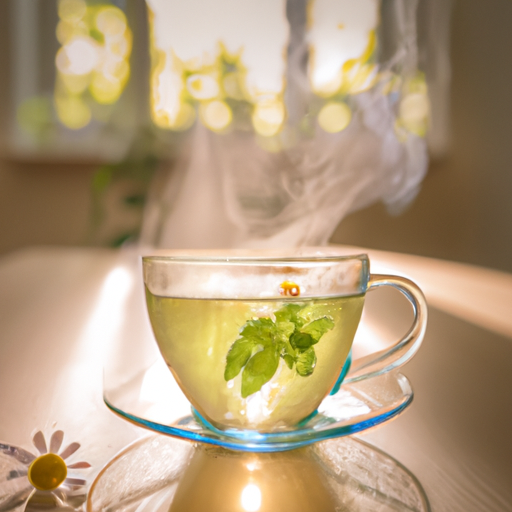Are you fed up with battling chronic inflammation? It’s time to harness the healing properties of nature and delve into the realm of herbal tea.
Like a soothing balm for your body, herbal teas have been used for centuries to reduce inflammation and promote overall well-being. In this article, I will guide you through a selection of herbal teas that have been scientifically proven to combat inflammation. These teas are not only delicious, but they also offer a holistic approach to healing, addressing the root cause of inflammation rather than just masking the symptoms.
From the vibrant yellow hues of turmeric tea to the calming effects of chamomile, each herbal tea on our list has its own unique properties that can help alleviate swelling, pain, and discomfort.
So, grab a cup, sit back, and let nature’s remedies work their magic. It’s time to sip your way to a healthier, inflammation-free life.
Key Takeaways
- Turmeric tea contains curcumin, a compound known for its powerful anti-inflammatory properties.
- Ginger tea has potent anti-inflammatory properties and can alleviate pain and improve digestion.
- Chamomile tea has calming effects and anti-inflammatory properties, suitable for reducing inflammation and alleviating symptoms such as joint pain and digestive issues.
- Hibiscus tea has anti-inflammatory properties, can provide relief for chronic inflammation, and supports the immune system.
Turmeric Tea
You can soothe your body and calm inflammation by sipping on a warm and comforting cup of turmeric tea. Turmeric, a golden spice commonly found in Indian cuisine, has been used for centuries due to its numerous health benefits. Not only does it add a vibrant color and flavor to dishes, but it also contains curcumin, a compound known for its powerful anti-inflammatory properties.
Incorporating turmeric into your daily routine can promote overall health and well-being. To make turmeric tea, simply boil water and add a teaspoon of ground turmeric. You can enhance the flavor by adding a pinch of black pepper, which helps increase the absorption of curcumin. Feel free to experiment with other ingredients like ginger, honey, or lemon to create delicious and refreshing turmeric tea recipes.
Now, let’s move on to the next section about ginger tea.
Ginger Tea
Ginger tea is a wonderful option for reducing inflammation in the body. Not only does ginger have potent anti-inflammatory properties, but it also contains compounds that can help to alleviate pain and improve digestion.
There are several ways to prepare ginger tea, including steeping fresh ginger slices in hot water, simmering grated ginger in a pot, or using a ginger tea bag.
Benefits of ginger for reducing inflammation
Symbolizing strength and healing, ginger has been known to be a powerful aid in reducing inflammation. Research on the effects of ginger on inflammatory diseases has revealed its numerous benefits. Ginger contains compounds called gingerols, which have been shown to possess anti-inflammatory properties. These compounds inhibit the production of pro-inflammatory cytokines, molecules that play a key role in the inflammatory process.
Additionally, ginger has been found to reduce the activation of certain genes involved in inflammation. Furthermore, ginger has been shown to decrease pain associated with inflammation by inhibiting the production of pain-causing molecules. Incorporating ginger into one’s diet or consuming ginger tea regularly can provide these benefits.
In the next section, I will discuss different ways to prepare ginger tea, a delicious and soothing beverage that can enhance the anti-inflammatory effects of ginger.
Different ways to prepare ginger tea
Get ready to savor the delightful flavors of ginger tea by exploring different ways to prepare this soothing and invigorating beverage. Ginger tea can be enjoyed in various ways, each offering a unique twist to the taste and aroma. Here are three different ginger tea recipes to try:
-
Classic Ginger Tea: Simply simmer fresh ginger slices in hot water for about 10 minutes, strain, and enjoy the warm and comforting flavor.
-
Ginger Lemon Tea: Add a squeeze of fresh lemon juice to your classic ginger tea for a tangy and refreshing twist that also boosts your immune system.
-
Ginger Turmeric Tea: Combine grated ginger, ground turmeric, a pinch of black pepper, and some honey in hot water for a spicy and anti-inflammatory concoction.
Not only does ginger tea offer a delightful experience, but it also provides numerous health benefits. It can help reduce inflammation, improve digestion, relieve nausea, and boost your immune system.
Now, let’s move on to explore the wonders of chamomile tea.
Chamomile Tea
Sip on a warm cup of chamomile tea, and let its soothing essence transport you to a serene garden, where your body’s inflammation gently fades away.
There are different types of chamomile tea, including German chamomile and Roman chamomile, both of which have been used for centuries for their healing properties.
Chamomile tea is not only known for its calming effects, but it also has anti-inflammatory properties that can help reduce inflammation in the body. This makes it an excellent choice for those looking to alleviate symptoms of inflammation, such as joint pain or digestive issues.
Additionally, chamomile tea is often recommended for sleep and relaxation, as it can help promote a sense of calm and tranquility.
As we move on to the next topic about green tea, you’ll discover another powerful herbal tea that can also aid in reducing inflammation.
Green Tea
Green tea is a delightful and refreshing beverage that offers a multitude of health benefits. It’s well-known for its rich antioxidants and anti-inflammatory properties, making it an excellent choice for reducing inflammation in the body. Green tea benefits go beyond just reducing inflammation, as it’s also believed to boost metabolism, improve brain function, and lower the risk of various diseases, including heart disease and certain types of cancer.
To reap the benefits of green tea, you can enjoy it hot or cold and experiment with different green tea recipes, such as adding lemon or honey for added flavor.
Now, let’s move on to the next section about peppermint tea, another herbal tea that can also help reduce inflammation.
Peppermint Tea
Now, let’s explore another herbal tea that has been shown to reduce inflammation: peppermint tea. Peppermint tea is made from the leaves of the peppermint plant, which is a hybrid of watermint and spearmint. It has a refreshing taste and a soothing aroma, making it a popular choice for many tea lovers.
Peppermint tea has several benefits when it comes to reducing inflammation. It contains compounds like menthol and rosmarinic acid, which have been found to have anti-inflammatory properties. These compounds can help reduce the levels of inflammatory markers in the body and alleviate symptoms of inflammation in conditions like irritable bowel syndrome (IBS) and joint pain.
In addition to its anti-inflammatory properties, peppermint tea also offers other health benefits. It can aid digestion, relieve stress, and promote relaxation.
When is the best time to drink peppermint tea? It can be enjoyed throughout the day, but many people find it particularly beneficial to have a cup after meals to aid digestion or in the evening to unwind and relax.
Now, let’s move on to the next herbal tea that can help reduce inflammation: rooibos tea.
Rooibos Tea
Rooibos tea, also known as red bush tea, is a herbal tea that’s renowned for its anti-inflammatory properties. Regular consumption of rooibos tea has been shown to reduce inflammation in the body. This can help alleviate symptoms of various inflammatory conditions.
Additionally, rooibos tea offers a unique and delightful flavor profile. It has hints of sweetness and earthiness. It can be brewed using hot water and steeped for a few minutes. Alternatively, it can be enjoyed as an iced tea by brewing it in cold water overnight.
Anti-inflammatory properties of rooibos tea
Imagine soothing your inflammation and reducing pain simply by sipping on a cup of this herbal tea. Rooibos tea, known for its numerous health benefits, has been shown to possess anti-inflammatory properties that can help alleviate symptoms associated with inflammation.
Studies have indicated that the antioxidants present in rooibos tea can reduce inflammation by neutralizing free radicals in the body. Furthermore, the flavonoids found in this tea have been linked to improved cardiovascular health, as they may help lower blood pressure and reduce the risk of heart disease.
Incorporating rooibos tea into your daily routine can be a natural and holistic approach to managing inflammation. As we explore the unique flavors and brewing methods of rooibos tea, you’ll discover even more reasons to incorporate this soothing herbal tea into your wellness routine.
Unique flavors and brewing methods of rooibos tea
Indulge in an aromatic journey as you explore the unique flavors and brewing methods of rooibos, immersing yourself in the rich and diverse sensory experience it offers.
Rooibos tea is known for its distinct flavors, ranging from earthy and nutty to sweet and fruity. Its versatile nature allows for various brewing methods, including steeping, cold brewing, and even using it as a base for lattes and cocktails.
Not only does rooibos tea satisfy the taste buds, but it also provides numerous health benefits. Research suggests that rooibos tea may have anti-inflammatory and antioxidant properties, which can help reduce inflammation in the body. Additionally, it is caffeine-free and rich in minerals, making it a great choice for those looking for a soothing and refreshing beverage.
Now, let’s transition into exploring the unique qualities of hibiscus tea.
Hibiscus Tea
Hibiscus tea is known to have anti-inflammatory properties, which can provide relief for those suffering from chronic inflammation. When consumed regularly, this herbal tea can help reduce swelling and pain caused by inflammation in the body.
Here are some benefits of hibiscus tea:
-
Rich in antioxidants: Hibiscus tea contains high levels of antioxidants that help fight free radicals and protect the body against oxidative stress, which is known to contribute to inflammation.
-
Lower blood pressure: Studies have shown that hibiscus tea can help lower blood pressure, which is often associated with inflammation and cardiovascular health.
-
Immune system boost: The vitamin C content in hibiscus tea can support the immune system, helping to reduce inflammation caused by infections and allergies.
-
Delicious recipes: Hibiscus tea can be enjoyed in various ways, such as hot or iced, and can be combined with other ingredients like ginger or mint to create refreshing and flavorful recipes.
Incorporating hibiscus tea into your daily routine can be a tasty and natural way to combat inflammation and promote overall well-being.
Frequently Asked Questions
Are there any potential side effects or interactions to consider when consuming turmeric tea?
When consuming turmeric tea, it is important to be aware of potential side effects and interactions. While it is effective in reducing inflammation, it may interact with certain medications and cause gastrointestinal issues.
Can ginger tea be a suitable alternative for individuals with a sensitivity to turmeric?
As an expert in holistic remedies, I must say that ginger tea is a fantastic alternative for individuals with turmeric sensitivity. Ginger tea benefits include reducing inflammation and soothing digestive issues.
Can chamomile tea help with inflammation caused by specific health conditions, such as arthritis or digestive issues?
Chamomile tea can help reduce inflammation associated with arthritis and digestive issues. It has been shown to have anti-inflammatory properties and can provide relief for these specific health conditions.
What are the potential benefits of green tea in reducing inflammation, and is it effective for chronic inflammation?
Green tea has potential mechanisms to reduce inflammation, such as its high antioxidant content. Clinical evidence suggests it may be effective for chronic inflammation. However, it is important to consult with a healthcare professional for personalized advice.
Is peppermint tea recommended for alleviating inflammation in the digestive system, such as irritable bowel syndrome (IBS) or gastritis?
Peppermint tea offers numerous benefits for digestive health, including alleviating symptoms of irritable bowel syndrome (IBS) and gastritis. Its natural compounds can help soothe inflammation and reduce discomfort in the digestive system.
Conclusion
In conclusion, incorporating herbal teas into your daily routine can be a holistic and evidence-based approach to reducing inflammation. Just like a soothing rain shower on a hot summer day, these herbal teas act as natural healers, calming the storm of inflammation within our bodies.
Whether it’s the vibrant yellow of turmeric, the invigorating warmth of ginger, or the delicate petals of chamomile, each herbal tea brings its own unique blend of compounds that can help combat inflammation and promote overall well-being.
So, sip on these herbal elixirs and let the healing powers of nature work their magic.










